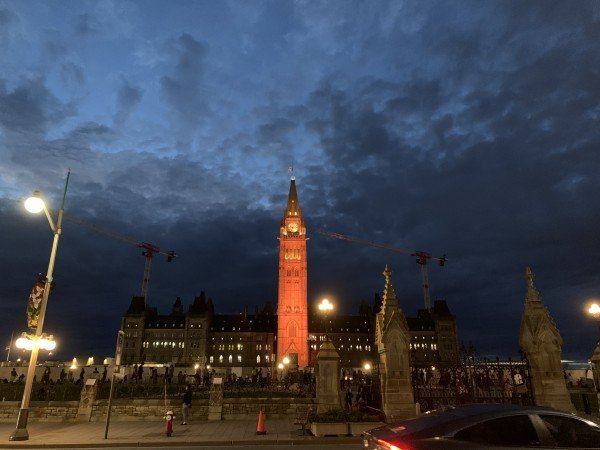Throughout the past few weeks, I have been thinking a lot about how much is changing around us all.
As we begin to see light at the end of the tunnel and slowly transition into our new normalcy, we realize how much has changed.
For 153 years, July 1st has been reserved for Canada Day celebrations.
However, this July 1st was very different than all that have come before it and will hopefully lay the foundation for all future celebrations.
The fact is, that for many people, Canada Day has never been a day for celebration. Rather it has been a reminder of the fact that Canada remains on the unceded and unsurrendered territory of the Indigenous peoples.
Following the discovery of now over 1600 unmarked graves of children who attended residential schools, for so many people in Canada, this Canada Day is the first one that has not been a day of celebration, but rather one of reckoning and mourning.
Children as young as three years old were stolen from their families, communities and culture.
At last, our country is discovering what Indigenous peoples have always known.
A heartbreaking number of them never returned home. This is not something for our country to celebrate.
There is nothing to celebrate when 1600 children’s remains are found.
Over 1600 children who never got to see their parents, siblings, grandparents, aunties and uncles, ever again.
Over 1600 children who never got to attend a real school, with their friends.
Over 1600 children who never got to achieve the dreams they had for their futures.
Their futures were stolen from them for no reason other than that they were Indigenous.
This Canada Day, all across the country, people of all ages took to the streets.
One of the people I work with, Madison Pate-Green attended the protests along with her friends.
She recounted to me how remarkable and inspiring It was to see seas of orange where there had always been seas of red and white.
The routine sounds of our national anthem and patriotic cheers were silenced by the inspirational wisdom and leadership of Indigenous elders. Their traditional songs were sung, their traditional dances were danced. All while racialized and non-racialized people alike watched with admiration, love and respect.

Parliament Hill in Ottawa on Canada Day, 2021.
July 1, 2021 was not just symbolic, it was historic.
To quote the wise words of Pam Palmater:
Cancelling Canada Day fireworks and parades will not end Canada, nor will it erase our history. What it might do, however, is rewrite our future history.
Many feel this level of recognition and acknowledgement of the peoples who were here before us is long overdue.
Over six years ago, Senator Murray Sinclair championed the Truth and Reconciliation Commission. Its final report put forth 94 recommendations as to how the Canadian government could bolster and prove its commitment to a true nation-to-nation relationship with First Nation, Inuit, Metis and non-status Indigenous peoples.
The report concluded that at least 4000 to 6000 children who forcibly attended residential schools, were killed and never found.
Among those recommendations, was a call on the government to provide resources to find the unmarked graves of all the children whose lives and futures were stolen.
This year, we have begun to reckon with the discomfort of these realities.
We all felt the weight of a past and present which have long been ignored. My greatest hope is that we are marking a new era so that our future may not relive the same injustices.
Every person in Canada has a vested interest in realizing a more just country. Every person in Canada has felt pain, fear and anger over the past year and a half.
Our emotions have not been dismissed. Our governments have made us feel heard. They have worked hard to address the unprecedented circumstances we face in the best way they can.
Now, it is our responsibility to recognize how it would feel if instead of feeling heard, we were ignored. We were told we were wrong. We were beaten, murdered and disappeared. We were confined to residential schools or foster care and then quickly shuffled into the ever-revolving prison doors.
These are not scenarios that any Indigenous family in Canada has to imagine.
So, where do we go from here?
We continue to listen, learn and actively educate ourselves about the parts of history which have been intentionally left out of our textbooks.
As a country, we need to continue centring an understanding of Systemic Racism in everything we do. We need to unlearn racist behaviours which have become normalized.
In doing so, we begin to actively challenge our own views and ideas as we recognize they have been built upon a colonial occupation which many deem to be genocidal in nature.
We make space for the voices, bodies and souls which have been relegated to our margins.
When we think about what the future of our country should look like, we have a responsibility to think carefully about all perspectives and ideas.
This will not be easy, it will take a lot of work for a long time and it will feel uncomfortable. Lean into your discomfort. What is it telling you?
All throughout history, change has never been comfortable, but it has always been necessary.
As we embark on this monumental journey of transformation, I encourage all my listeners to understand the significance of this journey and support this movement forward for our entire country, as a whole.
In closing, I wish to highlight the powerful words of elder Claudette Commanda who spoke in front of Parliament Hill, which remains on the unceded and unsurrendered Algonquin territory:
“when one of us cry, we all cry. When one us fall, we all fall. When one of us succeeds, we all succeed.”